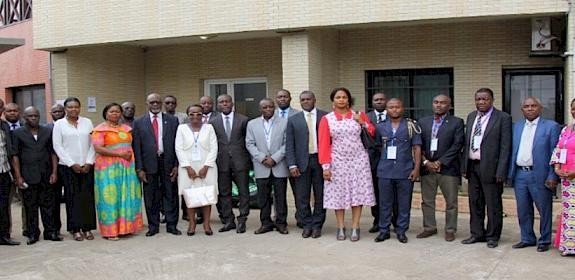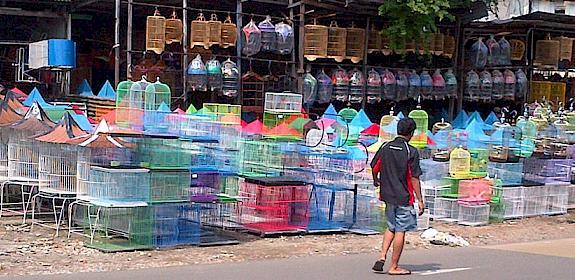Tackling Corruption in a Time of Crisis
 Cambridge, 23 March 2021
Cambridge, 23 March 2021
By Willow Outhwaite – Senior Programme Officer at TRAFFIC
The pandemic has tragically claimed millions of lives and placed countries in complete economic and social lockdown, with the threat of a global recession looming. But the pandemic is not just an immediate human health crisis; it also poses a long-term socio-economic ramifications for people who depend on natural resources such as timber, fisheries and wildlife.
Socio-economic impacts threaten healthcare, food supply and livelihoods and also pose increased risks of corruption. To ‘build back better’ from the pandemic, we need anti-corruption measures to be built into COVID recovery strategies.
As governments, business leaders, policy makers, anti-corruption experts, civil society and academics meet this week for the virtual 2021 OECD Global Anti-Corruption & Integrity Forum, governments must ensure the recovery strategies they develop will mitigate the socio-economic impacts of the pandemic to prevent corruption in the natural resource sector. The Forum takes place from 23rd – 25th March 2021 and aims to explore the new integrity risks, challenges and opportunities that have arisen in the COVID-19 context.
High hopes are pinned on innovative solutions that will build a more resilient and more ethical future.
Our research has found corruption is prevalent in the natural resource management sector. Corruption can be systemic in countries where illegal harvest is common. Serious allegations of bribery and fraud occur at all levels of governance; from issuance of harvest permits, to officials checking trucks at checkpoints, to government ministers with authority over all stages of the production and transport of wildlife products.
Particular risks surround the permits and licenses often required for harvesting, breeding, processing, verifying health and trading wildlife - including timber and fish.
From intentionally declaring false information on permits and the unofficial payment for permits, through to the use of counterfeit permits and the use of stolen permits, abuse of documentation, including Convention on International Trade in Endangered Species of Wild Fauna and Flora (CITES) permits and certificates, is a global issue that can happen anywhere in the trade chain.
Processes like these are vulnerable to corruption unless measures are taken to increase transparency in who access rights are allocated to, and how the permits and licence systems operate. Although some examples of document abuse seem relatively small-scale, others indicate the involvement of organised criminal networks with global reach.
Corruption isn’t only found in the harvest and trade of charismatic high-profile species such as rhinos, elephants and rosewood. Various forms of corruption are reported in wild plant supply chains, including bribery, collusion, nepotism, and favouritism. Thousands of consumer products contain ingredients from wild-harvested plants, with trade tripling in the last decade. This is being driven by expanding natural ingredients markets, including demand for alternative treatments for COVID-19. Supply chains can be long and complex, and consumers and manufacturers may not even be aware that a product contains wild ingredients, or where the plants originated.
This increasing trade will place more pressure on populations of wild-collected plants, so it is all the more necessary that factors like corruption, which could lead to unsustainable levels of trade that endangers species and livelihoods of rural communities who harvest the plants, are understood and mitigated.
But how can we address such corruption in wildlife supply chains? As a starter, governments, authorities, companies, communities and others with a stake in managing resources can focus on improving their governance of wildlife, enhancing the implementation of traceability approaches and adopting voluntary certification standards."
Corrupt influences in permits and certificates systems damage efforts to protect endangered plants and animals, but corruption can be greatly reduced by replacing paper documents with secure e-permits and improving the regulation of processes, including for trade in CITES-listed species.
Innovative technologies offer some hope. In the timber trade, wood forensics scientists are developing wood identification technologies that have the potential to bring unprecedented transparency and accountability to the international trade in forest products.
TRAFFIC has been working with Tanzania’s Forest Service Agency to roll out hand-held devices, similar in size to a credit card machine, to combat the illicit trade of timber. As a truck leaves the forest and passes through multiple road checkpoints, these devices allow officers at each checkpoint to report the species and volume onboard to a central database, replacing a disjointed, inefficient paper-based system. Such tracking tools improve transparency and increase compliance of timber traders and law enforcement.
Behaviour change approaches to influence the motivations, attitudes, values and actions of those engaged in corrupt practices offers another way to tackle natural resource corruption. A new “INTEGRITY” framework has been developed to pair non-specialists with a behavioural change approach that helps to tackle any form of corruption, be it petty or grand.
Yet awareness of these technologies and approaches, and how they can be applied to thwart crime and corruption at different points in the supply chain from forest to finished product is currently limited.
The pandemic has quite clearly demonstrated how animal and planetary health are inextricably linked with human health and well-being, with governments and the private sector already talking about nature-based stimulus packages for a greener, more robust future. However, these efforts will only be undermined if anti-corruption solutions are not an integral part of the recovery process. Those attending the OECD Global Anti-corruption and Integrity Forumthis week must put a sustainably managed environment, free from corruption at the heart of these crucial discussions. Only then can we start to meet the aim of restoring trust and integrity, and building a more resilient and ethical future.




